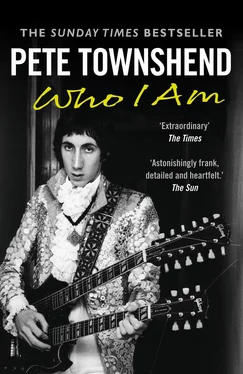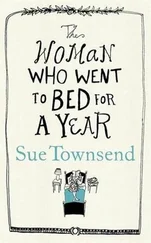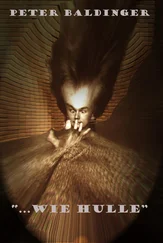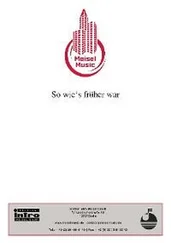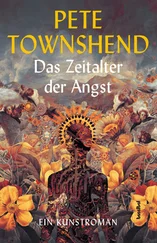Finally the grand orchestra takes over: ‘cello, cello, cello, cello’; a great celebration. The rescuer has arrived. In fact my reluctant rescuer was Mum, with her lover and Jimpy in tow as peacemaker. Dad was waiting at home to see whether Mum would relent, dump her lover and take him back, or fight him for custody of me. As cellos soar, the subject of the opera proclaims: ‘Do my eyes deceive me, am I back in your arms?’ I know I felt as though I had been rescued from Hell itself.
Then, there is an elucidation: ‘I missed you, and I must admit, I kissed a few …’ (Perhaps this refers to Mum’s affair.)
Most disturbing of all is the line, ‘[I] once did sit on Ivor the engine driver’s lap, and later with him had a nap.’ Then suddenly, everyone is ‘forgiven’, not once but a thousand times, over and over – as though there’s not enough forgiveness in a single line. When I sang this part live on stage, I would often become furious, thrashing at my guitar until I could thrash no more, frantically forgiving my mother, her lover, my grandmother, her lovers, and most of all myself.
During one of the October Quick One sessions I met Jimi Hendrix for the first time. He was dressed in a scruffy military jacket with brass buttons and red epaulettes. Chas Chandler, his manager, asked me to help the shy young man find suitable amplifiers. I suggested either Marshall or Hiwatt (then called ‘Sound City’) and I explained the not-so-subtle differences. Jimi bought both, and later I chided myself for having recommended such powerful weapons. I had no idea when I first met him what talent he had, nor any notion of his charisma on stage. Now, of course, I’m proud to have played a small part in Jimi’s story. Kit and Chris snapped him up for Track Records – their first new signing.
Apart from ‘A Quick One While He’s Away’ I wrote one song for the Quick One album, ‘Join My Gang’, which I didn’t even submit, having overfilled my quota. Instead I gave it to Paul Nicholas, a singer on Reaction who was at that time going under the pseudonym of ‘Oscar’ and who was managed by Robert Stigwood (‘Stiggy’). It’s a witty song, and I was sad it wasn’t a hit. David Bowie, then unknown, stopped me in the street in Victoria and told me he liked it, and that was before it was even released – he’d heard my demo at our music publisher’s office.
In October and November The Who toured Europe: Britain, Sweden, Denmark, France and Germany. I remember Berlin as war-scarred and still uneasy; it was at the Hilton there that Keith’s hotel-room wrecking began in earnest. He so missed Kim and suffered so much from paranoid jealousy that every night after a show he had to get out of his brain just to sleep, and seemed always at the last gasp to be full of the most dangerous anger.
In Amsterdam, after a television show there, we were walking straight from the TV studio stage towards the car taking us to our hotel when a tough-looking young man saw me passing and asked if I’d go for a drink with him. I agreed on the spot, and – while even Keith looked on shocked and concerned, shouting at me not to go – went off with the man. I had no money, no details of the show we were playing next day in The Hague and no idea who the man was, or what his intentions were.
His first question was, ‘Do you like jazz?’ As we sat together and listened to his impressive jazz collection, I quickly got drunk. After a while the evening turned into a blur. He showed me to a small bedroom alongside the room we’d been sitting in, and I fell asleep. I woke up next morning with a policeman standing over me, asking me who I was. The owner of the flat, a woman, had no idea who my host had been. After being allowed to leave, I found the railway station and boarded a train by jumping a fence. The train was full of young soldiers who took no notice of me. I could have been invisible, even dressed, as I was, in bright white clothes and a face full of stage make-up and mascara, hung over and a little scared.
9 ACID IN THE AIR
We had heard rumours throughout 1966 of a new drug called LSD that promised the most amazing experiences. It sounded scary but exciting. I got hold of some Sandoz capsules, and Karen and I and two friends from art school took a capsule each and waited to see what would happen.
When the drug kicked in, after about an hour, I felt an initial panic. Then the hump of the high took over, in which I lost all self-control and suffered hallucinations, which lasted another hour. After that I settled into something far more enjoyable. I felt like a child again, and I spent the next four or five hours rediscovering everything I took for granted: stars, moon, trees, colours, London buses. I remember being amazed at how pretty my girlfriend was. Eventually I began to put myself back together, piece by piece.
Karen and I only took one or two more acid trips together, and I only ever took four in total. The second trip began in Notting Hill. We walked from there all the way to the Roundhouse on New Year’s Eve 1966, waiting for the drug to take hold. By the time we arrived – The Who were due to perform at about three in the morning – I was coming down. My performance that night is reputed to have been destructive and angry, but I felt quite loved up, so I’m sure I was just going through my usual motions.
On 6 January 1967 I missed one of the only Who shows of my career through drug abuse, when I took my third acid trip and realised I couldn’t possibly drive 300 miles to Morecambe where we had a show. Instead I went to see the Pink Floyd play for the first time at the UFO Club. Syd Barrett was wonderful, and so were the rest of them. I fell in love with the band and the club itself, especially John Hopkins (‘Hoppy’ as he was known), who ran the club and worked the door.
I went again the following night. This time I didn’t use acid and took Eric Clapton to see Syd, who walked on stage (off his head on acid), played a single chord, and made it last about an hour using an electronic echo machine called a Binson. When he did start to play again he was truly inspiring. Roger Waters had the most incredible presence, was strikingly handsome and clearly fancied Karen. I found him a little scary. It was evident that he was going to be the principal driving force behind Pink Floyd. What no one could have known, as the band hadn’t yet made any recordings, was how glorious so much of their music would become once Syd’s more experimental influence waned.
One night a group of Mods exposed themselves to Karen and her friends as they danced, oblivious, in an acid haze. I was wearing a long psychedelic robe, and one of the Mods told me I’d let the side down. I retorted that Mod was finished; I was rather sad when, rather than argue with me, he and his mates just zipped up their flies and left.
In 1967 a mild spring brought premature blossoms to the trees in the huge private communal garden of Eccleston Square. Karen’s family had a house on the Thames’s upper reaches, and we spent Sundays there, just enjoying the passage of time, the tranquillity of the river and countryside, long walks and conversation about all manner of subjects.
The new swinging Sixties ethos – free love, girls on the pill, and everyone in our new London crowd behaving as though they were suddenly beautiful – played directly into my intense fear of being abandoned by Karen. One day I returned late after a gig to find a man talking to Karen in her bedroom. There was an air of intimacy between them, and she looked especially pretty and flushed. After I shooed him out I felt jealous and old-fashioned: everyone else was sharing their partner with whomever they fancied.
One night I listened again to the demo of ‘I Can See for Miles’. There wasn’t much more I could do to improve on it. I was ashamed of the jealousy that had inspired it, but I regarded the song as a secret weapon; when it was recorded properly and released as a Who single I believed we would flatten all opposition. Knowing we would be recording a third album fairly soon, I began to think about what kind of songs I wanted to gather.
Читать дальше
